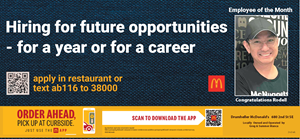
Dear Working Wise:
Some employment ads and websites ask for salary expectations, but I’m not really sure what to say or include. What should I do when this happens? Signed, Wondering about Wages
Dear Wondering:
It can be unnerving to name a salary figure for yourself. You don’t want to appear greedy and screen yourself out of the competition over a few dollars, but at the same time, you don’t want to sell yourself short either.
That’s why it’s so important to do your research.
Salary can depend on many factors, including location, industry, occupation, your experience level, and any special skills you have to offer.
Local market conditions often impact salary. You may be able to ask for more money if the position has been difficult to fill, if there has been a lot of turnover, if the local cost of living is higher than in other regions or if the occupation is in short supply.
If there are a large number of people competing for the same job, the employer might have an advantage and hire the best qualified person who asks for the lowest salary.
Do your research:
o Look at the salary range of similar advertised positions;
o Talk to people in similar positions and get their opinions;
o Research the current labour market conditions (e.g., unemployment rate, turnover, etc.) to gauge demand by visiting http://employment.alberta.ca/lmi;
o Check professional associations or union websites for salary grids and salary survey results;
o Check the Alberta Wage and Salary Survey available at: www.alis.alberta.ca/wageinfo. This comprehensive survey of almost 6,300 employers contains salary information for more than 400 occupations.
Confidence in your salary expectations will come from your research. You may also impress the employer if you can explain where you got your number from.
Remember, compensation is more than just salary. It includes other benefits like: health benefits, insurance, pension plans, annual vacation, and professional development.
Although the employer is likely only asking for salary, you should keep these other items in mind in case you’re asked during the interview.
When you include that salary information in your application or cover letter, try to use it in a neutral statement. Emphasize the job opportunity as the most important part in your decision and that you would consider a reasonable offer.
Don’t bring up salary during the job interview—let the employer do that. In your discussion try to give a range and not a specific amount and let them know that you understand that compensation extends beyond salary.
Don't be too concerned if salary is not discussed. It is likely to come later and it’s best left until after the employer has decided to offer you the job. That way, you are on a more even playing field with the employer—you want the job and they want to hire you.
Good luck!
Do you have a work-related question? Send your questions to Working Wise, at charles.strachey@gov.ab.ca. Charles Strachey is a regional manager with Alberta Employment and Immigration. This column is provided for general information.

















